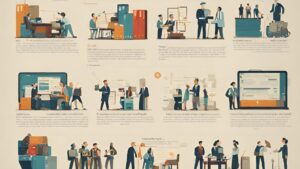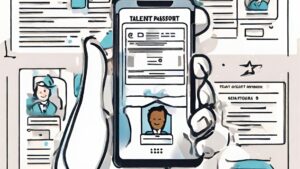Bridging the Gap: How AI and Data Standards are Revolutionizing Skills-Based Hiring
In a rapidly evolving job market, the quest for equity in talent acquisition has become paramount. The traditional hiring process often relies on subjective judgments, leading to disparities in opportunity and representation. However, the convergence of data standards and artificial intelligence (AI) is poised to transform skills-based hiring into a more equitable, efficient, and inclusive practice. In the “Connecting Competency Communities” webinar held on September 20, 2023, experts Elliot Robson and Jim Ireland explored the revolutionary potential of these innovations. This article delves into the key takeaways from the webinar and offers insights into the implications for employees and individuals.
Data Standards for Equitable Hiring
Jim Ireland, representing HR Open Standards, shed light on how standardized data from Learner and Employment Records (LERs) can revolutionize hiring. The use of data standards addresses one of the fundamental challenges in talent acquisition: equity. It ensures that the hiring process is based on objective criteria rather than subjective biases. By leveraging standards, HR management systems can create a level playing field for all candidates, fostering a more equitable hiring process.
LERs and the LER Resume Standard (LER-RS) play a pivotal role in this transformation. These records encapsulate an individual’s learning and employment journey in a structured and verifiable format. They provide a comprehensive view of an individual’s skills, competencies, and achievements. The LER-RS, in particular, enhances traditional resumes by making them verifiable, machine-readable, and trustworthy. This standard allows for selective disclosure, ensuring that individuals have control over their data.
AI-Driven Competency Management
Elliot Robson, CEO of Eduworks, introduced the transformative capabilities of AI-driven language models in competency management. Language models, often categorized as generative AI, excel at interpreting human concepts and intent. They serve as a bridge between individuals and organizations, facilitating seamless communication in the modern job ecosystem.
AI translation layers are a breakthrough in this context. They translate human speech into machine actions on datasets, allowing users to have meaningful conversations with underlying data. For job seekers and employers, this means the ability to express their needs, constraints, and desires in natural language while maintaining context and intent.
Competency alignment services powered by AI include KSA extraction, generation, and alignment. These services extract, generate, and score competencies, ensuring that job descriptions, course materials, and individual profiles align seamlessly. This enhances existing competency-based communication, enabling organizations to leverage their natural language without sacrificing alignment precision.
The Implications for Employees and Individuals
The integration of data standards and AI in skills-based hiring has profound implications for employees and individuals. Here are some key takeaways:
- Equity and Fairness: The use of data standards reduces bias in hiring by focusing on objective criteria. This means that individuals are evaluated based on their skills and competencies, irrespective of their background or personal characteristics. This fosters a fairer and more inclusive job market.
- Trust and Verification: The LER-RS brings trust and verification to resumes and profiles. Employers can rely on the veracity of the information provided, reducing the risk of hiring based on false or exaggerated claims. Individuals can showcase their skills with confidence, knowing that their achievements are backed by trusted data.
- Personalization and Collaboration: AI-driven competency management enables personalized career pathways and learning recommendations. Job seekers receive guidance tailored to their goals and industry trends, while employers can match candidates more effectively with job roles. This promotes collaboration between educational institutions and employers, creating a symbiotic relationship for talent development.
- Continuous Learning: The dynamic nature of the job market requires continuous learning. AI-powered recommendations for courses, certifications, and skill-building opportunities empower individuals to stay competitive and adapt to changing circumstances. This supports lifelong learning and career resilience.
- Communication Enhancement: AI translation layers enhance communication between individuals and organizations. This means that even individuals with limited digital literacy can express themselves effectively in the digital job ecosystem. It bridges the gap between human intent and machine-readable data, making the job search process more accessible.
The “Connecting Competency Communities” webinar showcased how data standards and AI innovations are reshaping skills-based hiring practices. By focusing on equity, trust, personalization, and effective communication, these advancements hold the potential to revolutionize the job market.
For employees and individuals, this translates into a future where opportunities are based on skills, where trust is a fundamental aspect of hiring, and where personalized career pathways are readily accessible. As we embrace data standards and AI-driven competency management, we pave the way for a job ecosystem that benefits everyone, regardless of their background or digital literacy. In this evolving landscape, the spoonful of sugar that makes the medicine go down is the promise of a more equitable and inclusive world of work.





